Candidates spend sh137b on campaigns
Jan 22, 2016
President Yoweri Museveni spends sh27b in two months

Follow this link for more election related stories
By Vision Reporter
The NRM presidential candidate, Yoweri Museveni has spent sh27b on his 2016 campaigns in two months, according to results of a study on campaign financing released yesterday. In the 16 districts reviewed, Museveni spent sh4.8b in November and sh22.2b in December.
Independent presidential candidate Amama Mbabazi, who followed, in terms of spending, spent sh1.3b. Dr. Kizza Besigye, the Forum for Democratic Change (FDC) candidate spent sh976m. Prof. Baryamureeba spent sh95.7m, while Abed Bwanika used sh34.3m and Joseph Mabirizi spent sh26.4m. Maureen Kyalya used sh5.6m.
According to the survey by the Alliance for campaign finance monitoring (ACFIM), a non-government election watch organisation, and the parties spent sh49.6b in November and sh88.1b in December.
The report pointed out the NRM party candidates as leading in terms of campaign spending at 87%, trailed by independent candidates who have spent up to 7.9%, followed by the Forum for Democratic Change (FDC) at 2.1%, and GO forward political group at 1.1%.
Others are Democratic Party at 0.5%, Uganda People's Congress at 0.3% among other parties at 0.3%. According to the report, the expenditure by parties increased in December by 77% following the nomination exercise for MPs between December 3, and December 4.
In the report, ACFIM listed the printing of campaign materials such as T-shirts and posters, transport refund, hiring of buses, boda boda cyclists, cars, public address systems, media, campaign managers and agents, and entertainers among others as the main areas for campaign expenses.
Methodology
Explaining the methodology used to carry out the survey, Henry Muguzi, the National Coordinator ACFIM, said they covered 16 districts, which comprise of 74 constituencies, representing about 26% of the whole country.
"It is not easy tracing how these parties spend their monies, but we tasked out teams to make costing for items like public address systems, buses, printing of t-shirts by interacting with service providers for these parties, who would share with them the costs. We also had informers within the parties," explained Muguzi.
Muguzi added that during the survey, their observers submitted data on campaign events and incidents they observed directly and indirectly.
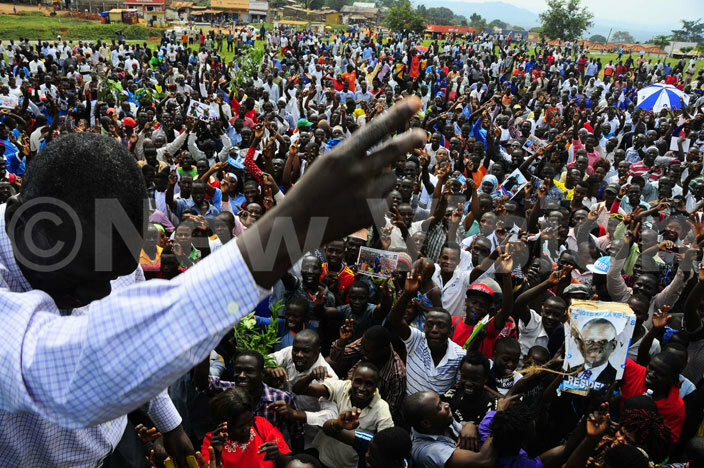 Besigye campaigns in Tororo. Picture by Kennedy Oryema
Besigye campaigns in Tororo. Picture by Kennedy Oryema
He pointed out poor record keeping by political parties as one of the main challenge they faced during the survey, noting that most of the parties didn't have financial records on how much they have so far spent on campaign activities.
"If you went to the FDC or NRM offices and asked them how much money they have so far spent ever since their presidential candidates hit the road to carry out campaigns, they don't know. Most of the money is not receipted or acknowledged," stated Muguzi.
He explained that the AFCIM observers also interacted with local people who opened up to them on how they benefit from the parties and individual candidates.
According to the report, the parties incurred most of their expenditure in Kampala district at 26.5%, followed by Luweero district (17.0%), Masaka district (9.4%), and 6.9% for the districts of Iganga and Jinja.
The least expenditure was registered in the districts of Hoima, Nwoya, Lira, Kabarole and Kanungu, each with less than 3% of the total expenditure in the period of two months.
In the months of November and December, all the districts registered an increase in the expenditure by candidates or parties at an overall rate of 77.5%. The highest increase in expenditure was observed in the district of Kanungu with 156% increase, followed by Kabarole (134%) and Kabale (101%).
The least increment in expenditure was in the districts of Lira (39%), Hoima (52%), Nwoya (59%), and Luweero (65%).
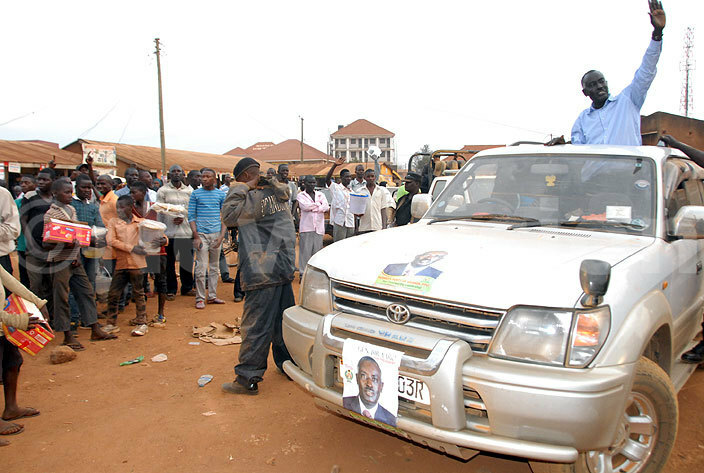 Maj. Gen Biraro at a campaign rally in Hoima. Picture by Robert Atuhairwe
Maj. Gen Biraro at a campaign rally in Hoima. Picture by Robert Atuhairwe
Expenditure by Presidential candidates
The Report shows NRM's presidential flag-bearer, Yoweri Museveni with majority of the total minimum expenditure, standing at 91.1% of the total minimum expenses recorded.
He is followed by Amama Mbabazi whose expenditure accounts for 4.6% and Kizza Besigye at 3.3%. According to the report, the rest of the candidates spent less than 1.0% combined.
Despite a decline in candidate Museveni's expenditure in the month of December, the researchers attributed President Museveni's high expenditure to use of a special branded chopper, which is reportedly hired at $4,000 (13.6m) per hour, and advance teams, which are deployed ahead of the incumbent's rallies in different parts of the country.
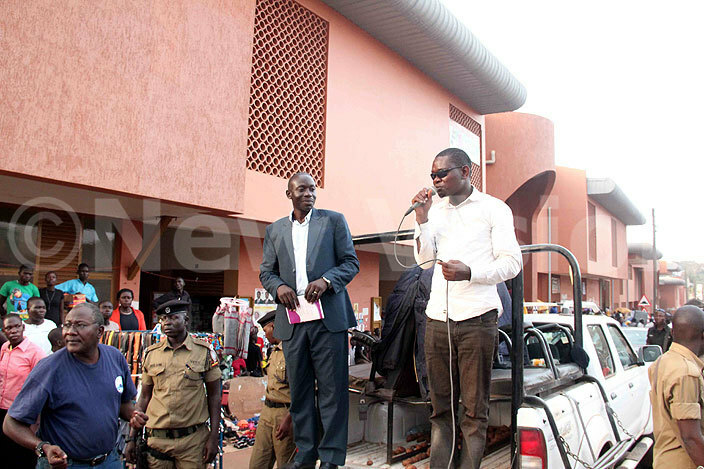 Mbabirizi in Lira. Picture by Hudson Apunyo
Mbabirizi in Lira. Picture by Hudson Apunyo
The report indicated that whereas presidential candidates increased their expenditure, between the months of November and December, some reduced on their observable expenditure.
The candidates who reduced their expenditure were Maureen Kyalya with a 47% reduction and Amama Mbabazi with a 41% reduction.
However, the rest of the candidates increased their expenditure with Kizza Besigye leading at 554%, followed by NRM's Museveni at 354% increase.
Independent candidate Venansius Baryamureeba was at 29%, Abed Bwanika (PPP) at 36% and Joseph Mabirizi at 29% increase in expenditure.
Asked whether they were able to establish the source of funding by the parties, Muguzi said it was hard for them to identify the sources where the parties/candidates draw their funding, adding that besides the FDC presidential candidate Kizza Besigye who is given money at his rallies, Presidential candidates such as Museveni, are favoured by state resources.
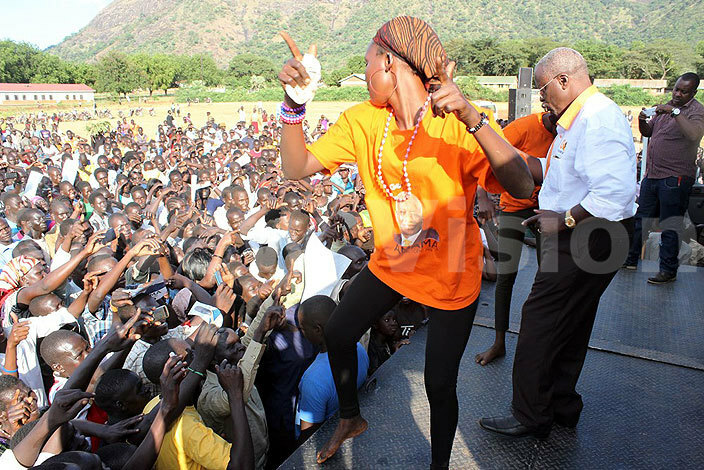 Mbabazi canvass for votes in Abim
Mbabazi canvass for votes in Abim
"I don't think party members can contribute that much money towards the campaigns. For example, if parties like the NRM have failed to construct its party headquarters, where do they get the money from? I feel this money is from the government coffers," argued Muguzi.
In their recommendations, AFCIM called upon government to put in place a law that requires political parties to declare their source of funding for political activities like campaigns.
They also urged the ministry of justice and constitutional affairs to consider amending legal provisions on voter bribery in the presidential Elections Act 2005 and the Parliamentary Elections Act 2005 to strengthen punishment against voter bribery.
" Some candidates come and declare openly in churches, saying I have given your iron sheets worth sh50m, and another one saying I'm giving sh70m to a women group ," said Katesi Najjiba a member of AFCIM .
Speaking during the launch of the monitoring campaign expenditure report at Hotel Africana yesterday, Peter Wandera the executive director Transparency International Uganda, also chairman AFCIM, said there is need to regulate funding for political parties and individual candidates to bar some parties from bribing voters at the expense of poor political parties.
"We are going to have a compromise in the quality of leaders to be elected, the voter will say give me what you have and I will vote for you," said Wandera.
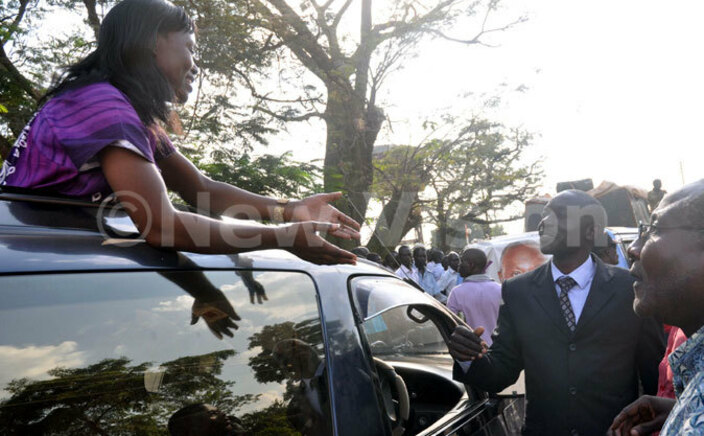 Kyalya during one of her campaigns
Kyalya during one of her campaigns
All political parties are by law required to declare their source of funding to the Electoral Commission. However, when contacted yesterday, the commission's publicity Jotham Taremwa declined to comment on the report.
Political Parties speak out on the report.
NRM's campaign task force spokesperson, MP Mike Ssebalu said being a national political party; it is not surprising that the NRM's expenditure is above that of other parties.
"You don't expect NRM's expenditure to be on the same level with parties like DP, FDC, and UPC that have not sponsored candidates in some constituencies. We operate on a national level; some of these parties only operate in towns. That is why their expenditure is low," explained Ssebalu.
He defended President Museveni's expenditure for a campaign, saying all the money he is using as the party's presidential candidate, is offered by the party where he is the chairman.
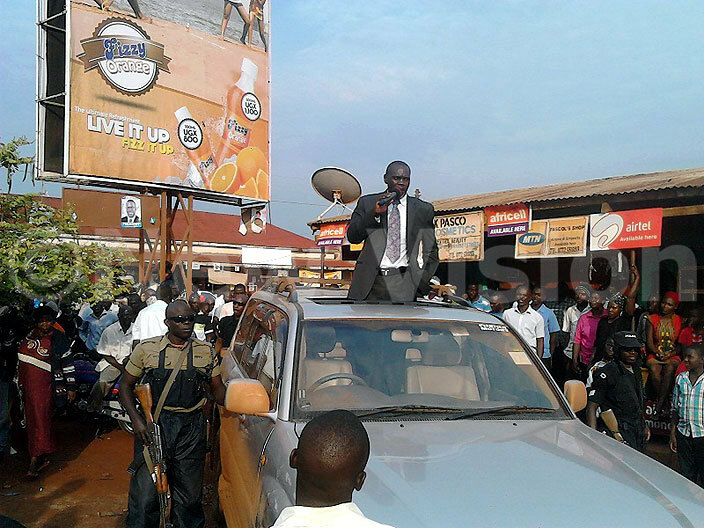 Bwanika in Masindi
Bwanika in Masindi
About the party's source of funding, Ssebalu noted that the party gets monthly contributions from party members such as MPs and well-wishers, to help the party run its activities.
Mathias Nsubuga (DP) said: "The funding we get from the Government is not enough, most of the money goes to NRM whose numerical strength is high. We have not fielded candidates in most constituencies just because we lack funding". He added that the party gets its funding from donors and party members to fund its activities.
Roland Mugume, the chairman FDC campaign task force western Uganda, said: "We get some funding from the Government and individuals like friends. It is just like when one has a wedding, you get contribution from friends. You find our expenditure is low because of the limited funding".
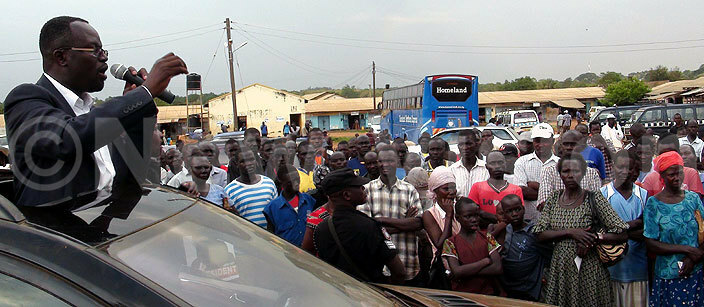 Prof. Baryamureeba campaigns in Kitgum. Picture by Katura Wokorach-Oboi
Prof. Baryamureeba campaigns in Kitgum. Picture by Katura Wokorach-Oboi
Follow this link for more election related stories
